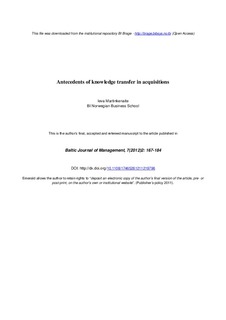| dc.description.abstract | Purpose
The purpose of this paper is to examine the role of knowledge‐specific, organizational and inter‐organizational antecedents of transfer in business acquisitions. A study gives special attention to the intrinsic nature of knowledge, absorptive capacity of the acquirer and acquiree, and inter‐firm relationships as key antecedents of transfer.
Design/methodology/approach
A study provides a comprehensive literature review on the antecedents of knowledge transfer in acquisitions. The paper consolidates, annotates and critiques the existing research on knowledge‐related, organizational and inter‐organizational antecedents of transfer in a specific, yet under‐researched context of acquisitions.
Findings
The paper reveals four major limitations of the current body of literature: underestimated role of ambiguous and dynamic nature of knowledge in conceptual frameworks of knowledge transfer; implicit simplifying assumptions about the role of dynamic capabilities of the two combining organizations to absorb knowledge; lack of systemic analysis of antecedents, learning processes and performance outcomes of knowledge transfer; and lack of comparative analysis of acquisitions of different types which may reveal diverse patterns of knowledge transfer. The author calls for future research to use more direct observations, longitudinal data and multiple case study methods, so that dynamics and complexity of the knowledge transfer process in acquisitions is better revealed.
Originality/value
Although our understanding of the complexities of knowledge transfer in acquisitions has increased dramatically over the past years, there remain sufficient gaps and openings for further research to be addressed. As a major contribution to the field, this paper points to the high explanatory power of knowledge ambiguity, lack of absorptive capacity on behalf of the acquirer and acquiree, and the arduous relationship between the two firms as barriers to knowledge transfer in acquisitions. | |
